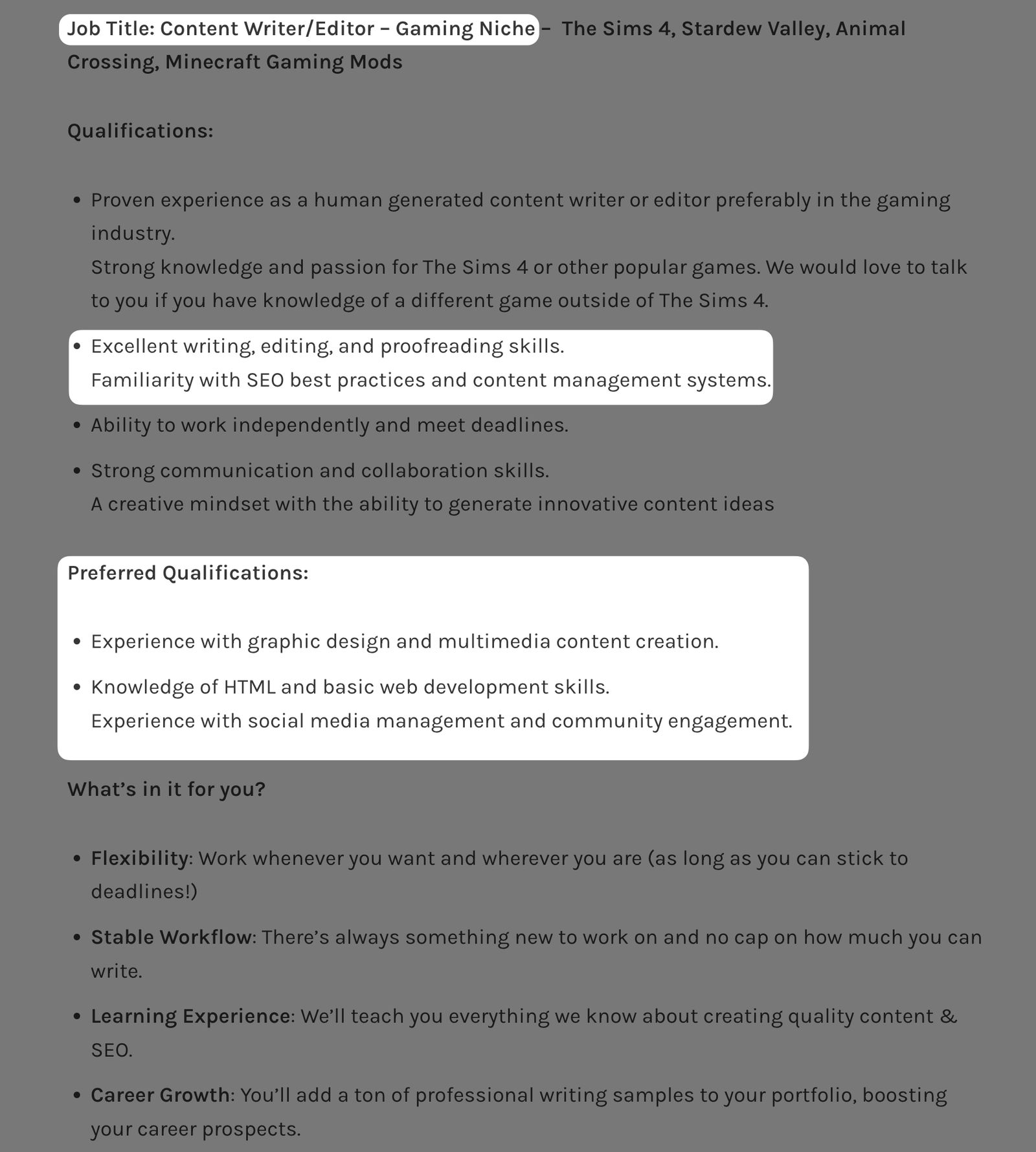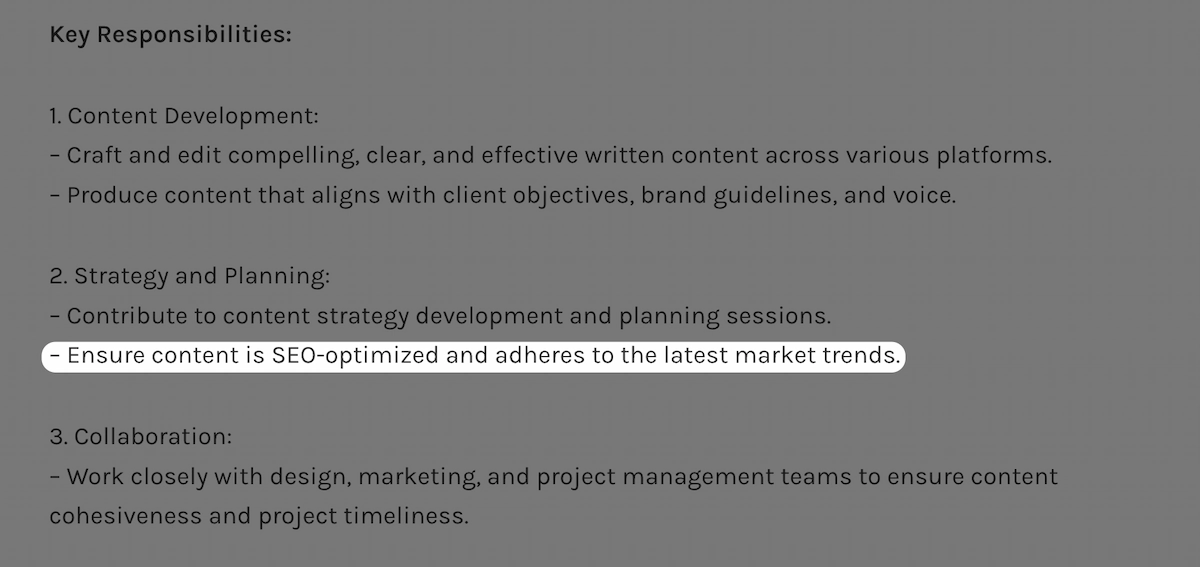When I was a beginner freelance writer, I was always scouring the internet for tips and tricks that would help fast track my success. I’ve learned a lot over the years, and I’ve distilled my knowledge down to 13 useful freelance writing tips for beginners.
1. Use Job Boards And Freelance Marketplaces
This first tip is about the important part of freelance writing—making money. You can’t make money without any clients, but getting them as a beginner can seem impossible. But two of the easiest places to get your first freelance writing clients are job boards and marketplaces like Fiverr and Upwork.
Let’s start with job boards, and in particular ProBlogger (one I used a lot when I first started). This is a website where clients put up job ads for writers (and sometimes editors and content managers) and you can apply to them, usually through an online application form. You tell them about your experience and show off any of your past work in the hopes of landing the role.

You’ll find clients in the sports niche, those that need writers for coffee websites, and everything in between. Some niches are less competitive than others. And it’s worth checking out a few different job boards to see what’s in demand.
Here are a few other popular choices:
Freelance marketplaces like Fiverr and Upwork are other good places to start, as you can advertise your services rather than relying on the clients advertising their jobs (although the exact process varies between platforms).
It can take time to gain traction on these sites, but there is an abundance of buyers out there that need freelance writers for all kinds of roles. Plus, like ProBlogger, there are clients on sites like Fiverr looking for writers in every niche you can imagine!
Editor’s Note: These platforms are now pretty saturated. Especially since AI writing tools have both reduced some brands’ need for human writers (whether for better or worse) and led to many people trying to make a quick buck using them. So levels of competition can be high. But there are definitely still some good opportunities for beginners out there.
2. Remain Open Minded
On the topic of niches, you should remain fairly open minded as a beginner freelance writer. You might think you’re destined to write about cats or dogs for a living. But there may be a better opportunity for you in the home and gardening niche.
Perhaps you’re a big sports fan and would love to write about basketball. But you might come across a high paying writing job in the B2B niche that’s just calling out for someone with your skills.
When you start out as a freelance writer, you might find yourself writing about a whole host of random topics, some of which may not be of a lot of interest to you but help bring in some income. Once you start building up relationships with clients and gaining experience, you can start to niche down and specialize in niches to attract higher prices.
But as a total beginner freelance writer, it’s best to keep an open mind to all the opportunities that are out there. Specialize if you have the skills, but don’t completely disregard opportunities that may not seem like the perfect fit at first.
Plus, these seemingly random topics could open the door to more lucrative pieces of writing later down the line as you build up solid relationships and networks with clients.
3. Learn How To Sell Yourself
Regardless of where you find your clients, securing them is going to come down to how well you can sell yourself. You’ll need to get comfortable with the idea of putting yourself out there and telling people why you’re the right person for the job. This will be easier when you have some writing samples to show off (see the next tips). But you also need to play to your other strengths too.
Clients want writers that can stick to deadlines, so be sure to tell them how well organized you are and how you work well under pressure.
They also want immaculate spelling and grammar, so discuss your keen eye for detail.
Obviously don’t lie (if these example traits don’t apply to you, freelance writing may not be the ideal career path!). But ensure you come across as the right candidate for the job. Add any other skills you bring to the table too, such as SEO or graphic design. As clients may prioritize freelance writers with these skills depending on the project.

4. Get Your Writing Out There
Trying to secure clients as a beginner is often a daunting task because you may feel you don’t have the experience to land the jobs. So what should you do?
Make the experience for yourself!
Use websites like Medium to put your writing out there at no cost to you, to hone your writing skills, and even to learn what people like and don’t like. You could even get paid for your writing too!
You’ll then build up a portfolio of writing samples that you can send to clients. Just make sure the articles you write in places like Medium are of high quality, and that they’re worthy of showing off to potential clients.

5. Create A Blog
Another great way to create your own experience is to start a blog. Not only is this a potential revenue stream in itself, but it’s also the perfect way to put some writing samples together in a place you can point clients to. It’ll also come across as highly professional if you have your own freelancing website, and it shows clients that you’re a real person with real skills.
Taking the time to build a website requires skills and dedication in itself (and it can cost money too). But it’s also a great place to host as many samples of your writing as you want. You can build a website for very cheap (or even for free in some cases). So it’s definitely worth considering.
Editor’s Note: Chris here, creator of FreelanceReady.com. Just wanted to add that I’ve personally managed to land freelance clients as a result of running this blog. Mainly because I’ve had lots of my own writing samples to link to. And because it shows I have a wider range of skills beyond writing (like SEO and website management) that many clients prioritize.
But if you don’t fancy making your own site, I once again recommend Medium as a free way to get your writing samples out on the web.
6. Look To The Pros
Many freelance writers are willing to share their knowledge, insights, and experience for free. If you want to understand a specific writing style or term, a quick Google search will bring up plenty of guides and templates from those that have been there, seen it, and done it before you.
Fellow freelance writers on Twitter (now X) and LinkedIn are fantastic sources for practical writing tricks and tips. Find the writers whose work or career path you admire and read anything and everything they’ve written. Learning from their work and experience is an excellent way to accelerate your own writing skills.
7. Practice Different Writing Styles
Most freelance writers eventually find a niche, both in terms of subject matter and writing style. But as a beginner, it’s useful to get familiar with using a wide range of writing styles.
From short, snappy copy on a landing page to formal business writing in a white paper.
“Writing” is an umbrella term encompassing a range of different styles, including:
- Technical writing
- Copywriting
- Ghostwriting
- Content writing
- B2B writing
- Email marketing
And many more.
Familiarizing yourself with different writing styles is beneficial for both your clients and your own professional development. One of the best ways to do so is by reading.
“If you want to be a writer, you must do two things above all others: read a lot and write a lot. There’s no way around these two things that I’m aware of, no shortcut.”
— Stephen King
While reading examples of different writing styles, keep note of what you like, what you find effective, and even what you don’t like. This will help you establish your values as a writer, pick up new ideas, and improve your skills.
8. Develop Your Grammar And Spelling Skills
While we thankfully have spellcheckers to do a lot of the leg work, a good understanding of grammar and strong spelling skills are invaluable as a writer. With these, you reduce the risk of errors in your writing at an early stage. And you can work faster (with less editing).
Clients will be quick to turn you away if your grammar is poor, so it’s absolutely essential that you don’t neglect this aspect of your writing. Don’t just rely on spellcheckers either, as they’ll often miss things or suggest changes that don’t fit with the flow of the piece or the writing style.
Nailing grammar and spelling also opens the editor career path. This may be the logical progression from freelance writing if you enjoy fixing the mistakes of others and otherwise improving existing content. To be a good editor, you need to be a good writer!
Further reading: How To Become A Freelance Editor
9. Learn Basic SEO
If you’re doing any online writing, a working knowledge of basic search engine optimization (SEO) principles is essential. SEO involves using keywords (among other techniques) to help your website or article appear in the top-ranked results when someone types something into Google.
Most online writing involves a marketing aspect, whether it’s selling more products or attracting more readers. A basic understanding of SEO, including keyword research in particular, adds another string to your bow and will broaden your writing opportunities.
Plus, as I mentioned earlier, a lot of clients will specify knowledge of SEO as a requirement for the role.

If you plan to use your writing to make money, be it through your own blog or as a freelance writer, a basic understanding of SEO is key.
There is lots of information and plenty of tutorials available online to help you learn basic SEO principles to incorporate into your writing. This roadmap is an excellent resource in particular.
10. Take Time To Proofread Your Work
Proofreading is a crucial step in producing professionally written work. Proofreading involves checking for typos, missing words, inconsistencies, and spelling and punctuation errors.
There are plenty of good proofreading tools available online to help you with this process. But as I said above, gaining a solid understanding of spelling and grammar best practices is key if you want to be a successful freelance writer.
Don’t just rely on tools!
Top Writing Tip: Reading your work aloud is a useful proofreading technique. It will help you notice errors you may otherwise miss when reading to yourself.
On a similar note…
11. Learn How To Edit Properly
Getting a first draft on the page is just the first step. But all good writers edit their work multiple times. Editing is a vital part of the writing process, and it doesn’t just involve checking for spelling mistakes!
It involves trimming content, rewriting sections, and reorganizing your words to improve the clarity and overall effectiveness of your writing. During the editing process, remove any fluff that’s distracting from your key messages and that doesn’t add any value for your readers.
Although it may feel counterintuitive, one of the most useful editing tips is to not edit as soon as you finish writing. By stepping back from a piece of writing for a few hours, or even a few days, you can then reread it with fresh eyes and pick up on things you may not have previously noticed. (You’ll obviously need to factor this in if you’re writing on a deadline.)
Finally, many clients expect you to edit your own work so that they’re not left with more work to do when you submit a project. Even if they do have a dedicated editing team. If you can’t take the time to edit your own work on your own terms, expect clients to send things back to you for time-consuming revisions in the future!
12. Learn How To Research Effectively
A good freelance writer can write accurately and in-depth on a broad range of topics. But this doesn’t mean you need to be an expert in all the subjects you write about. What you do need is an ability to research effectively.
Targeting your research, finding quality sources, interpreting and verifying information, and organizing your research are all key skills great writers should have in their arsenal. By equipping yourself with these skills, you won’t have any trouble writing on any subject your clients request.
However, clearly some topics (such as law and medicine) will require some degree of solid expertise, not just the ability to use Google. But for many entry-level freelance writing jobs, you will be able to leverage solid research skills to get the work done.
13. Create A Swipe File For Inspiration
Our best ideas often come to us while we’re sitting on the bus, cooking dinner, or going for a run—basically anywhere that isn’t our workspace!
A good way to keep track of your ideas is to note them down and start compiling a swipe file. Originally a copywriting concept, a swipe file is traditionally a folder (virtual or physical) of inspiring advertising and marketing ideas.
But it’s a concept that works for all kinds of writing. As well as your notes, include any examples of good writing or other inspiration you come across. The next time you draw a blank when it comes to writing, a quick flick through your swipe file should help get the creative juices flowing!
Use These Tips To Become A Better Freelance Writer
Starting really is the hardest part of becoming a freelance writer. But it becomes easier when you employ some of our top freelance writing tips!
Once you do that, you’re well and truly on track to building your freelance writing career.
Check out our other guides if you want to learn more about becoming a freelance writer, such as our beginner freelance writing checklist.
Freelance Ready is reader-supported. That means some links on this website are affiliate links. If you sign up or make a purchase through these links, we may earn a commission.

